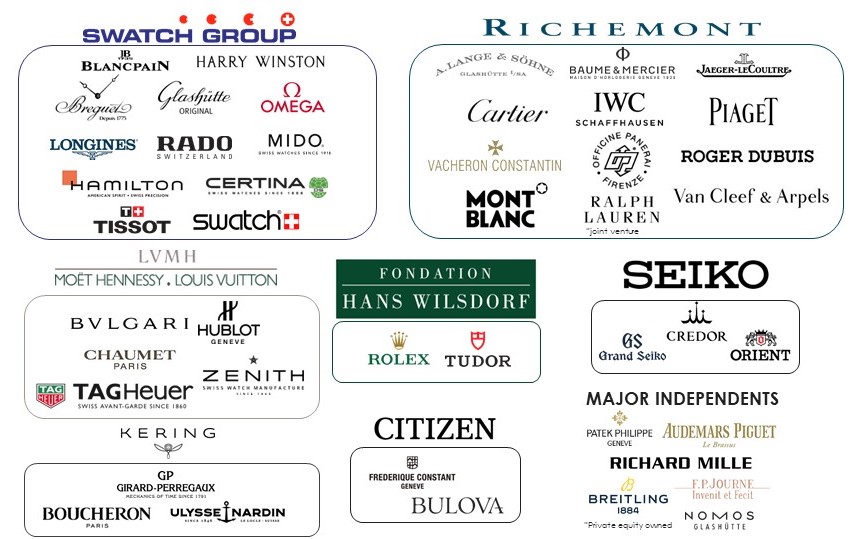Here at Rescapement, we’re constantly trying to remember which luxury conglomerate own what brand names. Over the past few decades, major luxury brands have become consolidated into a handful of holding companies. So, we decided to create a graphic to help ourselves remember who owns watch brands. Check it out below, and read on for a more detailed overview of each company.
Note the graphic only includes companies that are primarily or only watch manufacturers. For example, LVMH’s Louis Vuitton is known to produce watches, but because the brand is primarily known as a luxury leather goods company (damn those ubiquitous bags), the logo is not on our graphic. We’ve also decided not to feature “fashion” brands. For example, Swatch Group makes watches for Calvin Klein and Movado has a stable of fashion brands besides its eponymous brand (including newly acquired millennial favorite MVMT) — neither are included here. Read on for a full detail of which holding companies own what brands.
Swatch Group
Brands: Blancpain, Breguet, Harry Winston, Glashütte Original, Omega, Jaquet Droz, Leon Hatot, Rado, Longines, Hamilton, Certina, Mido, Tissot, Balmain, Ck Calvin Klein, Swatch, Flik Flak
Swatch Group was founded in 1983 by the merger of two existing holding companies. Since then, it’s acquired other brands such as Breguet, Blanpain, Glashutte Original, and Harry Winston. In 2016, Swatch Group brought in nearly $10 billion in revenue. It is a public company, headed by CEO Nicolas Hayek from Biel, Switzerland.
Richemont Group
“Specialist Watchmaker” Brands: A Lange & Sohne, Baume & Mercier, IWC Schauffhausen, Jaeger-LeCoultre, Officine Panerai, Piaget, Roger Dubuis, Vacheron Constantin, Ralph Lauren Watches (joint venture with Ralph Lauren)
Richemont Group organizes its brands into three operating divisions: (1) Specialist Watchmakers (above), (2) Jewellery Maisons, and (3) Other Businesses. Its Jewellery Maison division includes Cartier, Van Cleef & Arpels, and Giampiero Bodino, While its Other Business division is made up of Azzedine Alaïa, Chloé, Dunhill, Lancel, Montblanc, Peter Millar, and Purdey. Alltogether, Richemont is the second-largest luxury goods company in the world, after LVMH (below). It is a public company, headquartered in Geneva, Switzerland. It brought in more than $11 billion in revenue in 2017.
LVMH (Moet Hennessy Louis Vuitton)
Watches & Jewellery Brands: Bulgari, Chaumet, FRED, Hublot, TAG Heuer, Zenith
LVMH is the largest luxury goods company in the world, bringing in over $43 billion in revenue in 2017. It is headquartered in Paris, France, where Bernard Arnault — the richest person in Europe — serves as CEO. The jewellery and watches companies in its profiles have historically brought in about 10% of LVMH’s total annual revenue. In addition to the jewellery and watches companies focusing on watch manufacruting, a number of its other brands also offer sell watches, including: Dior, Fendi, Givenchy, Louis Vuitton, and Marc Jacobs (licensed to Fossil Group).
Kering
Brands: Gucci, Yves Saint Laurent, Boucheron, Girard-Perregaux, Ulysse Nardin
Kering is a luxury goods company headquartered in Paris, France. it brought in over $16 billion in revenue in 2017. While its primarily known for non-watch brands like Gucci, Yves Saint Laurent, Bottega Veneta, Balencia, and Alexander McQueen, it also houses a handful of respected watchmakers.
Hans Wilsdorf Foundation
Brands: Rolex, Tudor
Based in Geneva, the Hans Wilsdorf Foundation is a private charity, meaning it does not pay corporate income taxes. Upon his death, Rolex and Tudor founder Hans Wilsdorf gifted his shares in the company to the Foundation, ensuring the brands would remain held by the charity.
Seiko
Brands: Seiko, Grand Seiko, Credor, Orient
Seiko is a large holding company headquartered in Tokyo Japan. It brought in nearly $3 billion in revenue in 2016. It manufactures a variety of electronic devices, semiconductors, clocks, and of course, watches. It’s best known for ushering in the quartz movement in 1969, but continues to produce value-driven mechanical watches today. Under the Seiko brand, it has historically produced the budget Seiko 5 collection and the mid-range SARB collection. But their mid-range line has transitioned to using the “Presage” name. The company has also made efforts to separate its luxury Grand Seiko line from Seiko proper, as it expands the brand internationally. Credor is the home of its high-end haute horology timepieces
Citizen
Brands: Citizen, Bulova, Frederique Constant
Citizen Watch Company, headquartered in Japan produces watches primarily under the Citizen brand, which is most well know for its Eco-Drive solar technology. In 2008, Citizen acquired Bulova, making it the largest watchmaker in the world at the time. In 2016, it acquired Swiss brand Frederique Constant. Citizen’s Miyota division also produces watch movements that are used by many manufacturers (especially microbrands) to produce cheap to mid-priced mechanical watches.
Movado
Brands: Movado, MVMT, Ebel
Movado is a Swiss watchmaker, best known for their iconic Museum watch, which features a dot at 12 o’clock. It is now headquartered in New Jersey and trades on the New York Stock Exchange. Movado also produces licensed watches for Coach, Hugo Boss, Lacoste, Tommy Hilfiger, and Rebecca Minkoff.
Fossil Group
Brands: Fossil, Relic, Michele Watch, Skagen, Misfit, Zodiac
Fossil was founded in Richardson, Texas in 1984. By 2016, it was bringing in $3.6 billion in annual revenue, mostly from its watch sales. It produces licensed watches for a number of brands, among them Emporio Armani, Michael Kors, Marc Jacobs, Diesel, Kate Spade, Tory Burch, Burberry, Armani Exchange.
Timex Group
Brands: Timex
Timex traces its roots to the founding of the Waterbury Clock Company is Waterbury, Connecticut in 1854. In addition to its budget-conscious quartz watches produced under the Timex brand, it also produces licensed watches for Nautica, Guess, Salvatore Ferragamo, and Versace.
